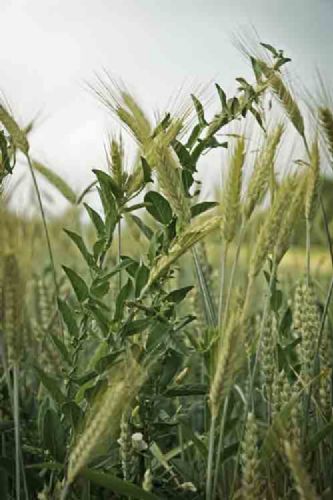The Parable of the Weeds
24 Jesus told them another parable: “The kingdom of heaven is like a man who sowed good seed in his field. 25 But while everyone was sleeping, his enemy came and sowed weeds among the wheat, and went away. 26 When the wheat sprouted and formed heads, then the weeds also appeared. 27 “The owner’s servants came to him and said, ‘Sir, didn’t you sow good seed in your field? Where then did the weeds come from?’28 “‘An enemy did this,’ he replied.
“The servants asked him, ‘Do you want us to go and pull them up?’
29 “‘No,’ he answered, ‘because while you are pulling the weeds, you may uproot the wheat with them. 30 Let both grow together until the harvest. At that time I will tell the harvesters: First collect the weeds and tie them in bundles to be burned; then gather the wheat and bring it into my barn.’”
Did you just catch that? I read this and I had stop right there and process it and say, 'Did he really just say that?!' So you might be saying now, 'Hold up! I answered 'no' to the first question! Anyway, what did he say?' Well maybe you ought to read that parable over again?
When I read this parable I realized something. The Sons of God, being represented by the wheat, were already planted and the sower of the good seeds--the Son of Man--knew the wheat from the weeds, and what's more, he planted the wheat originally. What does that mean? It means God knows exactly who is to be saved, and he knows who isn't.
But wait. What does that mean?
That means God has it all figured out. When He says 'move', you better move. It means that from the begining He ordained those who are saved, it means that there are some that he saved, and there were weeds that were already lost--that he knew were lost--that from the begining he knew that no matter what he could do, the sad reality was that they would never turn to him even if he tried for all of eternity.
'Okay,' you say, 'so why didn't God just destroy those people? Couldn't even a just God do that since he knew they would never turn?' But take a look at verses 29 and 30 again:
29 “‘No,’ he answered, ‘because while you are pulling the weeds, you may uproot the wheat with them.
30 Let both grow together until the harvest. At that time I will tell the harvesters: First collect the weeds and tie them in bundles to be burned; then gather the wheat and bring it into my barn.’”
The just God could have destroyed those people--he did it in Noah's day. So you say, 'Why would he do it then, and not now?' Look at the earth then, and look at it now. The Bible states in Genesis 6 that the earth was full of wickedness. But in verse 8 of that chapter the writer tells us that "Noah found favour in the eyes of the Lord"--Noah alone--he and his family, his sons and their wives, were the small remnant of those that could be saved. And so they were.
So what about the earth now? Noah's remnant was all of 8 people. There are 6.5 billion-some people on the earth today, and how many of those are God's remnant? And so I ask you, was it easier for a just God to show 8 questioning, unknowing human beings a dillemma of his wrath, or would it be easier to show hundreds of millions of questioning, unknowing human beings an even greater wrath? Now, I don't know the real reason God hasn't wiped all the wickedness away, I can only speculate, but the parable does tell us one thing; that if the harvesters were to pull out the weeds before the end, the wheat would be damaged and uprooted. For out of the flood God took Noah and his family, out of Jericho God took Rahab and her family, and out of Sodom he took Lot and his family, but were it for even ten righteous people, he would have spared even the wickedness of Sodom and Gomorrah. [Genesis 18:16-33] And for a billion he has spared even the wickedness of the earth.
29 “‘No,’ he answered, ‘because while you are pulling the weeds, you may uproot the wheat with them.
30 Let both grow together until the harvest. At that time I will tell the harvesters: First collect the weeds and tie them in bundles to be burned; then gather the wheat and bring it into my barn.’”
[The Parable of the Weeds Explained: Matthew 13:36-43]







No comments:
Post a Comment